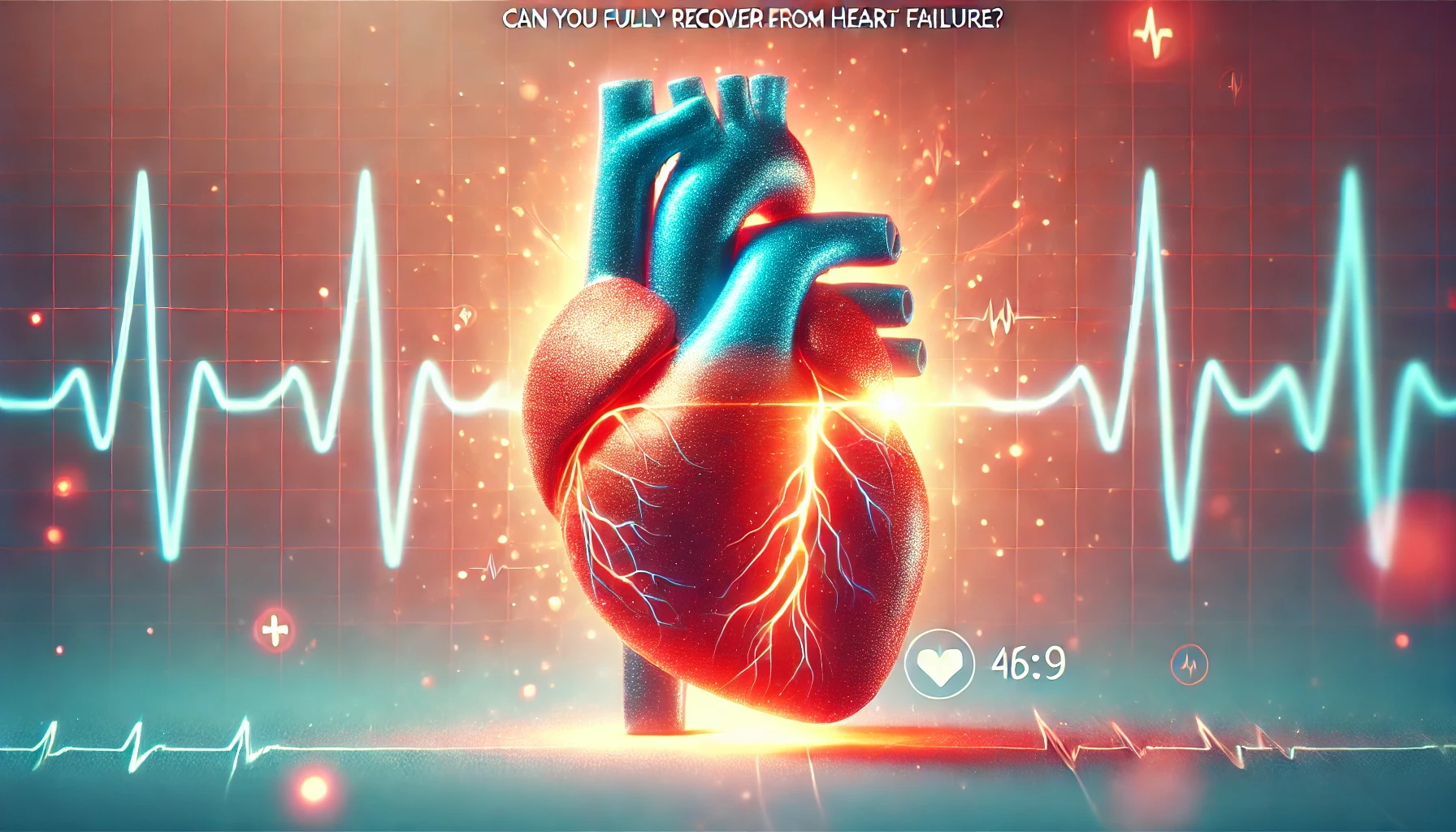Introduction
Can you fully recover from heart failure? Heart failure is a life-changing condition that affects millions of people worldwide. But does a diagnosis of heart failure mean life will never be the same? Can you fully recover from heart failure? Many people fear that once their heart weakens, there’s no way back. However, medical advancements, lifestyle changes, and proper treatment have given many individuals a new lease on life. In this guide, we’ll explore whether full recovery is possible and what steps you can take to improve your heart health.
Table of Contents
Understanding Heart Failure
What Is Heart Failure?
Heart failure occurs when the heart cannot pump enough blood to meet the body’s needs. It doesn’t mean that the heart has stopped working entirely; rather, it is struggling to function efficiently. This condition can develop due to high blood pressure, coronary artery disease, diabetes, or other underlying health issues.
Types of Heart Failure
There are different types of heart failure, including:
- Left-Sided Heart Failure: This occurs when the left ventricle struggles to pump blood effectively. It can lead to fluid buildup in the lungs, causing shortness of breath.
- Right-Sided Heart Failure: This affects the right ventricle, leading to fluid retention in the legs, abdomen, and liver.
- Congestive Heart Failure: A more advanced stage where fluid builds up throughout the body.
Causes and Risk Factors
Several factors contribute to heart failure, including:
- High blood pressure
- Coronary artery disease
- Diabetes
- Obesity
- Smoking and excessive alcohol consumption
- Family history of heart disease
Can You Fully Recover from Heart Failure?
The answer depends on the severity of the condition, early diagnosis, and lifestyle changes. While some people experience significant improvement and even reversal of symptoms, others may require long-term management. Let’s explore what determines recovery and how you can maximize your heart health.
Factors That Influence Recovery
- Stage of Diagnosis: The earlier heart failure is detected, the better the chances of improvement.
- Treatment Plan: Medications, lifestyle changes, and medical procedures can significantly impact recovery.
- Commitment to a Healthy Lifestyle: Diet, exercise, and stress management play a crucial role in reversing symptoms.
- Underlying Causes: If heart failure is caused by a reversible condition, such as an infection or a correctable heart valve issue, the chances of recovery increase.
Medical Treatments for Heart Failure
Medications
Doctors often prescribe medications to help the heart function more efficiently. Common medications include:
- ACE Inhibitors: Help relax blood vessels and reduce the heart’s workload.
- Beta-Blockers: Slow the heart rate and improve heart function.
- Diuretics: Reduce fluid buildup and prevent swelling.
- Aldosterone Antagonists: Help reduce sodium retention and lower blood pressure.
Medical Procedures and Devices
In some cases, medical interventions may be necessary, such as:
- Implantable Cardioverter Defibrillator (ICD): Helps regulate heart rhythm.
- Pacemakers: Assist in maintaining a regular heartbeat.
- Heart Transplant: In severe cases, a transplant may be the only option.
Lifestyle Changes for Heart Failure Recovery
Healthy Diet
A heart-friendly diet is essential for recovery. Focus on:
- Eating plenty of fresh fruits and vegetables
- Reducing sodium intake to manage blood pressure
- Avoiding processed and fried foods
- Consuming lean proteins like fish and chicken
- Staying hydrated but monitoring fluid intake if advised by a doctor
Regular Exercise
Staying active helps strengthen the heart and improve circulation. Recommended activities include:
- Walking
- Swimming
- Cycling
- Light strength training
- Yoga for stress reduction
Stress Management
Chronic stress can worsen heart failure. Practices such as meditation, deep breathing, and spending time with loved ones can lower stress levels and improve heart health.
Quitting Smoking and Limiting Alcohol
Smoking and excessive alcohol intake can damage the heart. Quitting smoking and moderating alcohol consumption can significantly improve overall health and heart function.
Success Stories: Can People Recover from Heart Failure?
Many people have successfully reversed or significantly improved their heart failure symptoms. Through medical treatments, lifestyle changes, and determination, individuals have regained strength and lived fulfilling lives. While not everyone may achieve full recovery, managing the condition effectively can lead to a high-quality life.
FAQs
1. Can heart failure be reversed completely?
While some people experience a complete reversal of symptoms, many require ongoing management. Early diagnosis and treatment improve the chances of recovery.
2. How long does it take to recover from heart failure?
Recovery time varies based on the individual, severity of the condition, and adherence to treatment. Some people notice improvements within weeks, while others take months or years.
3. What are the first signs of heart failure improvement?
Improvement signs include increased energy, reduced swelling, better breathing, and improved heart function as shown in medical tests.
4. Can lifestyle changes alone cure heart failure?
Lifestyle changes significantly impact heart health but may not be enough alone. Combining lifestyle changes with medical treatment offers the best results.
5. What foods should I avoid if I have heart failure?
Avoid high-sodium foods, processed meals, sugary drinks, and excessive caffeine to protect heart health.
6. Is exercise safe for people with heart failure?
Yes, but it should be done under medical supervision. Light to moderate activities can strengthen the heart without overexertion.
7. Can stress worsen heart failure?
Yes, chronic stress negatively affects heart health. Practicing relaxation techniques can help manage stress and support recovery.
Conclusion
Heart failure is a serious condition, but recovery and improved quality of life are possible with the right approach. By combining medical treatments, lifestyle changes, and a positive mindset, many individuals have successfully managed their symptoms and regained their health. If you or a loved one is facing heart failure, take action today by adopting heart-friendly habits and working closely with healthcare professionals. Share this post with someone who needs encouragement and guidance on their journey to recovery!
Read Also:- Is it possible to recover from heart failure?
